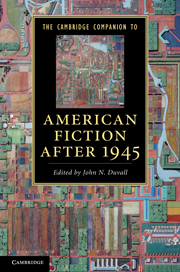Book contents
- Frontmatter
- Introduction: A story of the stories of American fiction after 1945
- PART I POETICS AND GENRES
- PART II HISTORICAL AND CULTURAL CONTEXTS
- PART III MAJOR AUTHORS
- 14 Ralph Ellison
- 15 Flannery O'Connor
- 16 Thomas Pynchon
- 17 Toni Morrison
- 18 Don DeLillo
- Conclusion: Whither American fiction?
- Index
- Cambridge Companions to …
16 - Thomas Pynchon
from PART III - MAJOR AUTHORS
Published online by Cambridge University Press: 28 March 2012
- Frontmatter
- Introduction: A story of the stories of American fiction after 1945
- PART I POETICS AND GENRES
- PART II HISTORICAL AND CULTURAL CONTEXTS
- PART III MAJOR AUTHORS
- 14 Ralph Ellison
- 15 Flannery O'Connor
- 16 Thomas Pynchon
- 17 Toni Morrison
- 18 Don DeLillo
- Conclusion: Whither American fiction?
- Index
- Cambridge Companions to …
Summary
Thomas Pynchon is perhaps best known for knowing a lot and not being known. His novels and the characters within them are typically engaged in the manic collection of information. Pynchon's fiction is crammed with erudition on a vast range of subjects that includes history, science, technology, religion, the arts, and popular culture. Larry McMurtry recalls a legend that circulated in the 1960s that Pynchon “read only the Encyclopaedia Britannica.” While Pynchon is renowned for the breadth and depth of his knowledge, he has performed a “calculated withdrawal” from the public sphere. He has never been interviewed. He has been photographed on only a handful of occasions (most recently in 1957). Inevitably, this reclusion has enhanced his cult status and prompted wild speculation (including the idea that Pynchon was actually J. D. Salinger). Reliable information about Pynchon practically disappears around the time his first novel was published in 1963.
While Pynchon the author is a conspicuous absence in the literary marketplace, his fiction has a commanding presence. His first major work, V. (1963), has a contrapuntal structure in which two storylines gradually converge. The first line, set in New York in the 1950s, follows Benny Profane and a group of his bohemian acquaintances self-designated the “Whole Sick Crew.” The second line jumps between moments of historical crisis, from the Fashoda incident in 1898 to World War II and centers on Herbert Stencil's quest for a mysterious figure known as “V.”
- Type
- Chapter
- Information
- The Cambridge Companion to American Fiction after 1945 , pp. 220 - 232Publisher: Cambridge University PressPrint publication year: 2011

